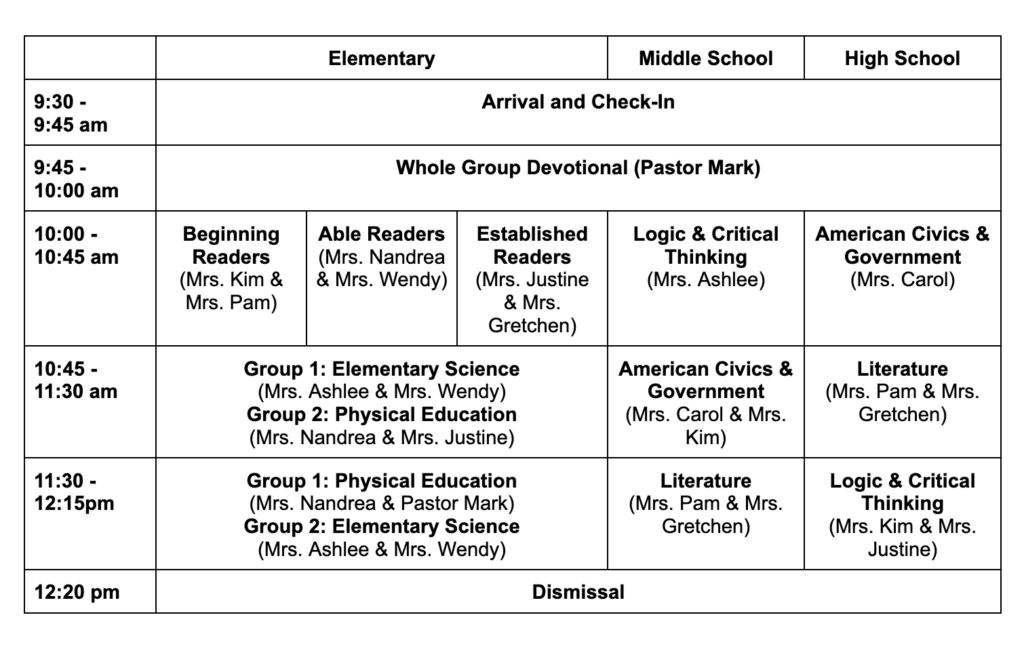Grace Baptist Church has established a FREE ministry resource for families that have chosen to Homeschool their children in our community. On Wednesday mornings from 9:45am to 12:15pm we will be having age-appropriate classes for Elementary, Middle, and High School students.
Arrival & Registration begins at 9:30am in the Sanctuary
Announcements, Prayer, & Devotional at 9:45am
Classes begin at 10:00am and run to 12:15pm
Dismissal will begin at 12:20pm from the main hallway outside of the Sanctuary
For proper security we are using an online sign-in system that requires each parent to bring their child into the church and come to pick them up at dismissal with the security tag assigned to their child. Please know that each teacher and helper is a member of Grace Baptist Church and has passed a national background check. Also, for the safety of each child, we will not be allowing parents to stay in the church after classes have begun.

Our Winter/Spring 2025 Class Schedule

Elementary Reading Lab: Our Reading lab is designed to help Elementary level children continue to develop their reading skills. Therefore, we will divide the children up into three basic groups (Early, Able/Learning, & Established) depending on their current abilities. Please know that we may make changes to which class your child attends based on how they develop throughout the year.
Beginning Readers: The Beginning Readers class is geared towards students who are early on in their reading journey. We will begin by reviewing letter sounds and move into blending sounds to form words (CVC words, words with consonant blends, words consonant digraphs, and long vowel-sound words). We will also focus on reading fluency and comprehension of passages using these word patterns. The class will follow the scope and sequence of the West Virginia Phonics Curriculum and The Science of Reading. The goal of this class is to build early literacy skills and help students develop a life-long love of reading.
Able/Learning Readers: Intermediate readers will start at individual reading levels reading 3-4 paragraph stories and answering questions to gauge comprehension. We will progress to group reading of small chapter books followed by discussion.
Established Readers: This class is for students who are proficient readers on a 3rd-5th grade reading level. The goals of this class are to build reading confidence, to inspire readers to explore the world of literature, to stimulate imaginations, and to expand vocabulary skills. This semester we will be “Mr. Popper’s Penguins” by Richard and Florence Atwater. This book will get imaginations moving as we immerse ourselves into the story of a family in a small town who suddenly become the owners of a penguin… and then two… and then 12. We will be using a novel study along with reading aloud to incorporate vocabulary, reading comprehension, and literary devices.
Elementary Physical Education: PE will be a combination of physical activity, nutrition and health. Every student will get positive reinforcement to understand the importance of a healthy lifestyle and achieve any health goals they desire.
Elementary Science:
K-2 – Hands on Science!
Students will explore science topics each week with a fun experiment from Usborne’s 100 Science Experiments. We will cover topics such as light, sound, magnetism, electricity, and weather.
Grades 3-5 – Exploring Creation with Chemistry and PhysicsDiscover the foundational elements of the universe and the building blocks of creation with Exploring Creation with Chemistry and Physics! from Apologia. Study how the universe functions through this exploration of matter and energy; lessons cover atoms and molecules, pH levels, types of mixtures, mechanics, laws of motion, dynamics of motion, energy, waves, light, machines, magnets, and more. Filled with bright photographs, fun “Try This!” experiments, and integrated narration questions, this Charlotte-Mason inspired guide to physics and chemistry will keep kids interested and engaged. Experiments, notebooking activities, “what do you remember?” narration questions, projects, and experiments help to reinforce concepts.
It is not necessary that families purchase this curriculum, but if you would like to continue the learning at home with your student and reinforce what they are learning each week in class, you may like to. A notebook will be provided for science journaling and notetaking.
Middle School American Civics & Government:
With the upcoming elections, this is a perfect time to learn all about our political parties, elections & the media. We will also look at our constitution, the branches of our government and our state and local government.
Middle School Logic:
The Basics of Critical Thinking from the Critical Thinking Company will be the spine of our first semester. About the book:
“This book not only teaches critical thinking skills, but what critical thinking is and what it means. Critical Thinking is taught through simple explanations, diagrams, and short engaging activities, and helps students learn argument forms and identifying and evaluating evidence-helpful skills they can use throughout life!
Contents covered include finding evidence, inferring and inferences, facts and opinions, facts and probably truths, facts/probably true/probably false, Venn diagrams, logical connectives, advertising, agreements and contracts, common errors in reasoning, and more.”
We will also use elements of Nathaniel and Hans Bluedorn’s The Fallacy Detective. About the book:
“Written for ages 12 through adult, readers will learn to recognize the fallacies they see every day, including the Red Herring, Ad Hominem attacks, the Straw Man, loaded questions, equivocation, circular reasoning, either-or, generalizations, analogies, propaganda, special pleading, slippery slope fallacies, and more. Dilbert, Calvin & Hobbes, Peanuts, and original cartoons illustrate many of the fallacies perfectly, and each chapter contains plenty of examples that make each fallacy easy to understand. Exercises and “The Fallacy Detective Game” provide fun ways to really remember what you’ve learned!”
Middle School Literature:
Learning History Through Literature: The Colonial Period – The Gilded Age. This class is designed to help students better understand the time period of American History, from the Colonial Period of the early 1600s to the Industrial Age (nicknamed The Gilded Age) of the late 1800s, through the use of Literature. We will explore various age-appropriate Literary genres of Nonfiction and Fiction, including Autobiography, Biography, Essay, Narrative, Speech, Historical Fiction, Poetry, and Short Stories. We will be reading selections from Primary Sources, as well as third person fictional and non-fictional narratives and historical accounts.
High School American Civics & Government:
With the upcoming elections, this is a perfect time to learn all about our political parties, elections & the media. We will also look at our constitution, the branches of our government and our state and local government.
High School Literature:
Learning History Through Literature: The Colonial Period – The Gilded Age. This class is designed to help students better understand the time period of American History, from the Colonial Period of the early 1600s to the Industrial Age (nicknamed The Gilded Age) of the late 1800s, through the use of Literature. We will explore various age-appropriate Literary genres of Nonfiction and Fiction, including Autobiography, Biography, Essay, Narrative, Speech, Historical Fiction, Poetry, and Short Stories. We will be reading selections from Primary Sources, as well as third person fictional and non-fictional narratives and historical accounts.
High School Logic:
Logic is the study of principles of correct reasoning. In a culture that is constantly bombarded with information, it is crucial for students to learn how to think logically about what they are seeing and hearing. In this class, we will focus on the skills needed to think rightly in our modern world. We will be pulling material from various sources, all of which will instruct students in evaluating and analyzing information that they are presented with, recognizing fallacies, and drawing applications from the analyzed information.

